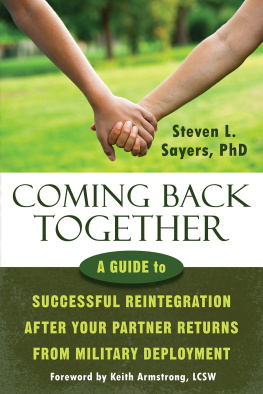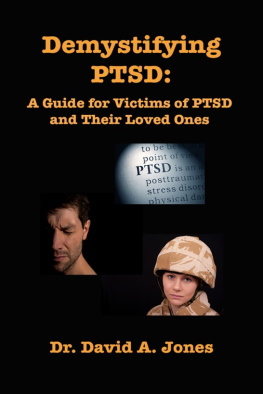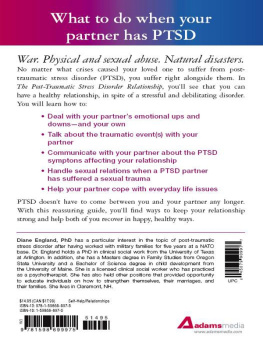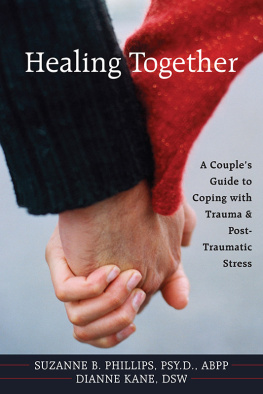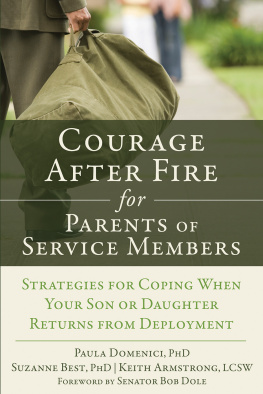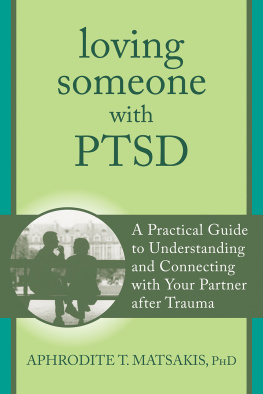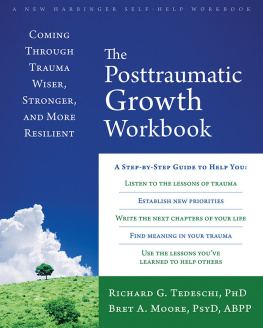
Steven L. Sayers, PhD, is associate professor of psychology in the department of psychiatry at the Perelman School of Medicine at the University of Pennsylvania. He is director of the Advanced Fellowship Program in Mental Illness Research and Treatment at the Philadelphia Veterans Affairs Medical Center. Sayers has published numerous articles regarding the role of family members and other social supports in mental and physical health.
Foreword writer Keith Armstrong, LCSW, is clinical professor of psychiatry at the University of California, San Francisco. He is director of the San Francisco Veterans Administrations (SFVA) Family Therapy Program and the City College of San Francisco Veterans Outreach Program, and is a member of the SFVAs PTSD Clinical Team. In addition, he is a consultant for the Intensive Family Therapy program at the University of California, San Francisco. Armstrong has authored numerous clinical and research articles and chapters addressing the treatment of traumatized individuals and families. He is also a reviewer for the Journal of Traumatic Stress, a top journal in the field of traumatology, and he has conducted numerous radio, newspaper, and podcast interviews on the psychological treatment of veterans and families. He lives with his wife and two children in the San Francisco Bay Area.
Written by a nationally recognized expert in the VA system in supporting veteran families, Coming Back Together is an empowering, helpful resource for partners of deployed service members and veterans. It teaches cognitive-behavioral skills to help partners cope with a range of issues upon a veterans homecoming, including intimacy, parenting, communication, and seeking professional assistance. Filled with poignant quotes from family members and practical exercises to spark reflection, this resource is certain to bring practical advice and comfort to many families.
Michelle D. Sherman, PhD, clinical professor at the University of Oklahoma Health Sciences Center and coauthor of Finding My Way: A Teens Guide to Living with a Parent Who Has Experienced Trauma and My Story: Blogs by Four Military Teens
This book is packed with practical wisdom for resuming your lives together after being apart due to military service. With his deep understanding of the issues families face, Sayers explains specific steps for success in reintegration. You can do this, and he will show you how.
Scott M Stanley, PhD, research professor at the University of Denver and coauthor of Fighting for Your Marriage

Publishers Note
This publication is designed to provide accurate and authoritative information in regard to the subject matter covered. It is sold with the understanding that the publisher is not engaged in rendering psychological, financial, legal, or other professional services. If expert assistance or counseling is needed, the services of a competent professional should be sought.
Distributed in Canada by Raincoast Books
Copyright 2014 by Steven L. Sayers
New Harbinger Publications, Inc.
5674 Shattuck Avenue
Oakland, CA 94609
www.newharbinger.com
Cover design by Amy Shoup
Acquired by Melissa Valentine
Edited by Gretel Hakanson
All Rights Reserved
Library of Congress Cataloging-in-Publication Data on file
To the spouses and other intimate partners of those who served in the US military and were deployed far away from their loved ones, their homes, and their country.
Contents
Acknowledgments
There were many positive forces behind the writing of this book.
I want to thank Melissa Valentine at New Harbinger Publications for bringing me the opportunity to write this book, and to Jess Beebe, Nicola Skidmore, Rachel Rogers, and the rest of the staff at New Harbinger for guiding the writing. Their professionalism and enduring positivity were essential in keeping the writing going at what felt like a blistering pace.
My wife, Margaret, and children, Douglas and Kenan, spent many weekends without my presence while I wrote. Their love and support helped me stay focused on the project, while giving me the freedom and space to get it done. Margarets expertise and input as a child psychologist was essential in the writing of chapter 7 on redeveloping relationships with children. A loving and wonderful experience in my family of origin also provided a solid background from which to understand the challenges that come with transitions.
I want to thank my able staff at Coaching Into Care, the US Department of Veterans Affairs call center, for helping family members and friends concerned about military veterans. Their work with family-member callers has brought to light the concerns and struggles that these family members face. I have drawn liberally from our work in the stories of partners adapted for this book.
The work of many cognitive behavioral theorists and clinicians informed the material in this book and has influenced my career. The seminal ideas and intervention strategies of Aaron Beck, MD, and David D. Burns, MD, informed many of the cognitive strategies I have described. Special thanks go to David D. Burns, MD, author of Feeling Good: The New Mood Therapy and many related books. He was the first to show me how important and powerful books written for the lay audience can be. Many relationship researchers and therapists have influenced the methods I have described, including my first professional mentor, Donald H. Baucom, PhD. In addition, Alan S. Bellack, PhD; Andrew Christensen, PhD; Norman Epstein, PhD; Howard Markman, PhD; Scott Stanley, PhD; and Robert L. Weiss, PhD, have all had a significant impact on my thinking and in some way influenced the content of this book.
I owe a debt of gratitude to the military service members who are routinely deployed to far-away places and put their lives at risk in service of our country. I am inspired by their sacrifice.
Foreword
Thirty years ago, when I began my career as a social work intern helping veterans, I encountered a very different system of care than what we have today. At that time, veteran services focused only on the military service member, leaving partners and family members out of the process. At best, partners and families of veterans were tacitly acknowledged by the health care system. At worst, they were viewed as an annoyance to be actively avoided. Sadly, these partners and families were left to solve problems on their own without guidance or help from health care professionals. Thankfully, this has changed.
Today, the family is seen as a critical collaborator in the provision of health care for the veteran. Even in individual therapies for veterans returning from war, inviting the partner or parent of the veteran to join the therapy is becoming more commonplace in many clinical settings. This is significant, since research has shown that veterans want their families involved in treatment (Batten et al. 2009). However, there is more work to do in this arena. Rather than asking whether we should include the family in the therapy process, we should instead be asking, Is there any reason to exclude the family from treatment? In the vast majority of cases, the answer will be a resounding no.
More than half of our military service members who have served in Iraq or Afghanistan are married. Clearly, the success or failure of these partnered relationships can affect the recovery and successful reintegration of recently deployed military service members. Yet while websites and books addressing the needs of veterans and their families are more common than five years ago and information for military families is more accessible than ever, few websites and even fewer books capture the partners experience of what it is like on the front lines when his or her military partner returns home from deployment.

